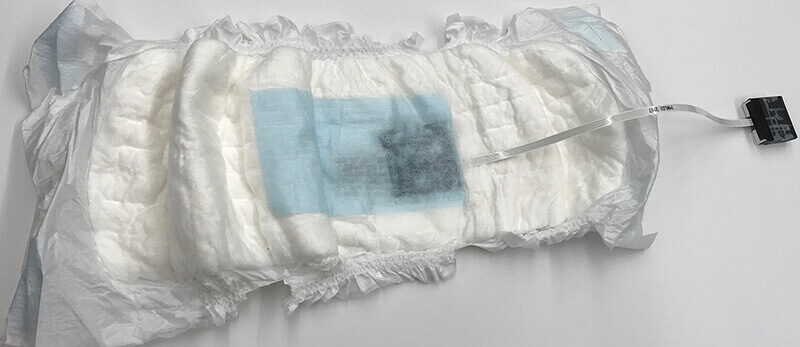May 1, 2019
Keeping it clean: How diaper sensors can better detect urinary tract infections, reduce more severe diseases
Technology could help caregivers find infections earlier in infants, elderly
WEST LAFAYETTE, Ind. – A urinary tract infection can be painful at any age, with the burning sensations, frequent urges and pressure. It can be even worse and more dangerous for those who may not be able to communicate clearly what is happening to their bodies, such as the elderly and babies.
Urinary tract infections are responsible for nearly 10 million doctor visits each year in the United States. They can also be a major source of additional disease, particularly for elderly people.
Many current technologies to try to detect UTIs can be difficult to use and require a urine sample be processed, which can be inconvenient and slow in receiving results.
Purdue University researchers have come up with a way to embed a disposable sensor device in diapers to better detect UTIs. A video showing the technology is available at http://bit.ly/2K72FYU. The device has been tested and proven to accurately detect UTIs.
 Purdue University researchers have come up with a way to embed a disposable sensor device in diapers to better detect urinary tract infections. (Image provided)
Download image
Purdue University researchers have come up with a way to embed a disposable sensor device in diapers to better detect urinary tract infections. (Image provided)
Download image
“Our technology can help detect UTIs in babies and the elderly who already wear diapers in daily living,” said Babak Ziaie, a professor of computer and electrical engineering in Purdue’s College of Engineering. “These people are often not able to communicate their symptoms or they do not show typical symptoms for UTIs.”
Urinary tract infections develop when bacteria get into the urinary tract and multiply, leading to redness and pain in the urinary tract. Some typical symptoms include an urgent need to urinate, a burning feeling when using the bathroom and a strong odor to the urine. The infection can easily spread to the kidneys and become more severe.
The Purdue researchers created a diaper-embedded transponder that, once activated by urine, measures and transmits the information via a wireless link to the caregiver. The sensor checks for nitrites, which are chemical compounds commonly associated with such infections.
“The transponder is autonomous, self-powered and provides accurate and timely information,” said Ziaie, who worked with Byunghoo Jung, a professor of computer and electrical engineering at Purdue. “It can easily be placed in a diaper and detect the presence of an infection.”
Doctors typically check for a urinary tract infection by testing a urine sample for bacteria and blood cells. A culture of the urine tells the doctor which bacteria are present.
“We have at least two big advantages here with our device,” Ziaie said. “It is autonomous, it does not require obtaining urine samples by the patient or their caregivers, and can help detect an infection in people who might not yet show symptoms.”
The researchers worked with the Purdue Office of Technology Commercialization to patent the technology. The research team is looking for additional partners and those interested in licensing the technology.
Their work aligns with Purdue's Giant Leaps celebration, celebrating the global advancements in health as part of Purdue’s 150th anniversary. It is one of the four themes of the yearlong celebration’s Ideas Festival, designed to showcase Purdue as an intellectual center solving real-world issues.
About Purdue Office of Technology Commercialization
The Purdue Office of Technology Commercialization operates one of the most comprehensive technology transfer programs among leading research universities in the U.S. Services provided by this office support the economic development initiatives of Purdue University and benefit the university's academic activities. The office is managed by the Purdue Research Foundation, which received the 2016 Innovation and Economic Prosperity Universities Award for Innovation from the Association of Public and Land-grant Universities. For more information about funding and investment opportunities in startups based on a Purdue innovation, contact the Purdue Foundry at foundry@prf.org. For more information on licensing a Purdue innovation, contact the Office of Technology Commercialization at otcip@prf.org and reference 2014-ZIAI-66713. The Purdue Research Foundation is a private, nonprofit foundation created to advance the mission of Purdue University.
Writer: Chris Adam, 765-588-3341, cladam@prf.orgSource: Babak Ziaie, bziaie@purdue.edu

